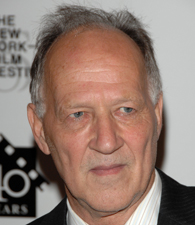Renowned German documentary filmmaker Werner Herzog focuses on the eccentric, the original and the fascinating in people and stories, reflecting his own inner nature. As one critic said, “If Werner Herzog didn’t exist, Werner Herzog would surely have created him.”
Werner Herzog’s Early Days
Werner Herzog was born Werner H. Stipetic in Munich, Germany, on September 5, 1942. He grew up in the mountain village of Sachrang in the Bavaria region of the country. All Movie Guide notes that Herzog “recognized his future vocation in his early teens.” Courting German producers, Herzog eventually got a screenplay optioned—until the producer discovered Herzog was still in his teens and backed out.
Sources in this Story
- Official Web Site of Werner Herzog: Short Bio
- All Movie Guide: Werner Herzog Biography
- Strictly Film School: Werner Herzog
- The Believer: Werner Herzog in Conversation with Errol Morris
- The Times of London: Dangerous waters: Werner Herzog
- Werner Herzog’s Rogue Film School: About
Herzog’s Filmmaking
Choosing to forge ahead on his own, Herzog’s work as a welder helped him finance the projects he was passionate about as a young man. He was able to produce his first film at the age of 20, the 12-minute “Herakles.”
In the 1960s, Herzog spent time in the United States, Greece and Germany, studying, filming and working odd jobs. He allegedly shot films for NASA and smuggled televisions into Mexico. Early on, he asserted himself as a social commentator, with films like “Even Dwarfs Started Small,” about little people who “descend into an anarchic state” in a German penal colony; it was banned in his home country but earned him critical praise.
“Aguirre: The Wrath of God,” released in 1972, marked Herzog’s arrival as a filmmaker. The film, a historical drama about a 16th century conquistador in search of a “city of gold,” was lauded by critics. The Web journal Strictly Film School calls it a “visually stunning and haunting portrait of obsession and madness” and a sophisticated commentary on man’s “innate greed and narcissism.”
This type of analysis of the human condition would become Herzog’s chief focus as a filmmaker, regardless of setting, cast or film genre.
With the 2005 documentary “Grizzly Man,” Herzog etched himself into contemporary American cinema with a work that was part “verité” and part documentary. He compiled and edited hours of footage that the film’s subject, Timothy Treadwell, shot of himself in an Alaskan nature reserve while living among grizzly bears. A haunting, amusing and psychologically complex film, it helped renew interest in Herzog’s films and expose them to a wider audience.
“Grizzly Man” is both appealing and disconcerting; Herzog discussed the film in an interview in The Believer, explaining that Treadwell “always wanted to be the movie star in his own movie”; so much of the experience of watching the film is simply witnessing Treadwell’s psychology as an actor—and as a person—unfold.
The Man and His Work
- “Werner Herzog Collection”
- “The Cinema of Werner Herzog: Aesthetic Ecstasy and Truth” by Brad Prager
The Rest of the Story
“If Werner Herzog didn’t exist, Werner Herzog would surely have created him,” wrote Christopher Goodwin in the Times of London in 2007. Herzog’s documentaries of eccentric, original and fascinating people demonstrate his desire to share the human experience, but also serve as an extension of his own colorful life off—and behind—the camera.
Herzog started a Rogue Film School in 2010, which is a four-day seminar that he runs periodically. The seminar, which people must apply to attend, does not teach technical aspects of filmmaking, but “is about a way of life. It is about a climate, the excitement that makes film possible. It will be about poetry, films, music, images, literature.” The required reading list includes Ernest Hemingway’s “The Short Happy Life of Francis Macomber” and a required viewing list includes Satyajit Ray’s Apu trilogy.
Interviews With Werner Herzog
Herzog was shot in the arm during a filmed interview with Kermode for the BBC Two in January 2006. He finished the interview without seeking medical attention.
- Interviewed by Dave Davies on NPR’s Fresh Air, January 2006
- Interviewed by Roger Ebert, April 2004
- Interviewed by Mark Kermode for The Guardian, January 2009
This article was originally written by Liz Colville; it was updated September 1, 2017.











